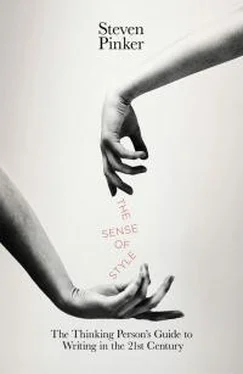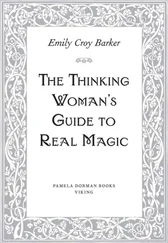In the last edition published in his lifetime, White did acknowledge some changes to the language, instigated by “youths” who “speak to other youths in a tongue of their own devising: they renovate the language with a wild vigor, as they would a basement apartment.” White’s condescension to these “youths” (now in their retirement years) led him to predict the passing of nerd, psyched, ripoff, dude, geek, and funky, all of which have become entrenched in the language.
The graybeard sensibilities of the style mavens come not just from an underappreciation of the fact of language change but from a lack of reflection on their own psychology. As people age, they confuse changes in themselves with changes in the world, and changes in the world with moral decline—the illusion of the good old days. 4And so every generation believes that the kids today are degrading the language and taking civilization down with it: 5
The common language is disappearing. It is slowly being crushed to death under the weight of verbal conglomerate, a pseudospeech at once both pretentious and feeble, that is created daily by millions of blunders and inaccuracies in grammar, syntax, idiom, metaphor, logic, and common sense. … In the history of modern English there is no period in which such victory over thought-in-speech has been so widespread.—1978
Recent graduates, including those with university degrees, seem to have no mastery of the language at all. They cannot construct a simple declarative sentence, either orally or in writing. They cannot spell common, everyday words. Punctuation is apparently no longer taught. Grammar is a complete mystery to almost all recent graduates.—1961
From every college in the country goes up the cry, “Our freshmen can’t spell, can’t punctuate.” Every high school is in disrepair because its pupils are so ignorant of the merest rudiments.—1917
The vocabularies of the majority of high-school pupils are amazingly small. I always try to use simple English, and yet I have talked to classes when quite a minority of the pupils did not comprehend more than half of what I said.—1889
Unless the present progress of change [is] arrested … there can be no doubt that, in another century, the dialect of the Americans will become utterly unintelligible to an Englishman.—1833
Our language (I mean the English) is degenerating very fast. … I begin to fear that it will be impossible to check it.—1785
Complaints about the decline of language go at least as far back as the invention of the printing press. Soon after William Caxton set up the first one in England in 1478, he lamented, “And certaynly our langage now vsed veryeth ferre from what whiche was vsed and spoken when I was borne.” Indeed, moral panic about the decline of writing may be as old as writing itself:

Non Sequitur © 2011 Wiley Ink, Inc. Dist. by Universal Uclick. Reprinted with permission. All rights reserved.
The cartoon is not much of an exaggeration. According to the English scholar Richard Lloyd-Jones, some of the clay tablets deciphered from ancient Sumerian include complaints about the deteriorating writing skills of the young. 6
My discomfort with the classic style manuals has convinced me that we need a writing guide for the twenty-first century. It’s not that I have the desire, to say nothing of the ability, to supplant The Elements of Style. Writers can profit by reading more than one style guide, and much of Strunk and White (as it is commonly called) is as timeless as it is charming. But much of it is not. Strunk was born in 1869, and today’s writers cannot base their craft exclusively on the advice of a man who developed his sense of style before the invention of the telephone (let alone the Internet), before the advent of modern linguistics and cognitive science, before the wave of informalization that swept the world in the second half of the twentieth century.
A manual for the new millennium cannot just perpetuate the diktats of earlier manuals. Today’s writers are infused by the spirit of scientific skepticism and the ethos of questioning authority. They should not be satisfied with “That’s the way it’s done” or “Because I said so,” and they deserve not to be patronized at any age. They rightly expect reasons for any advice that is foisted upon them.
Today we can provide the reasons. We have an understanding of grammatical phenomena which goes well beyond the traditional taxonomies based on crude analogies with Latin. We have a body of research on the mental dynamics of reading: the waxing and waning of memory load as readers comprehend a passage, the incrementing of their knowledge as they come to grasp its meaning, the blind alleys that can lead them astray. We have a body of history and criticism which can distinguish the rules that enhance clarity, grace, and emotional resonance from those that are based on myths and misunderstandings. By replacing dogma about usage with reason and evidence, I hope not just to avoid giving ham-fisted advice but to make the advice that I do give easier to remember than a list of dos and don’ts. Providing reasons should also allow writers and editors to apply the guidelines judiciously, mindful of what they are designed to accomplish, rather than robotically.
“The sense of style” has a double meaning. The word sense, as in “the sense of sight” and “a sense of humor,” can refer to a faculty of mind, in this case the faculties of comprehension that resonate to a well-crafted sentence. It can also refer to “good sense” as opposed to “nonsense,” in this case the ability to discriminate between the principles that improve the quality of prose and the superstitions, fetishes, shibboleths, and initiation ordeals that have been passed down in the traditions of usage.
The Sense of Style is not a reference manual in which you can find the answer to every question about hyphenation and capitalization. Nor is it a remedial guide for badly educated students who have yet to master the mechanics of a sentence. Like the classic guides, it is designed for people who know how to write and want to write better. This includes students who hope to improve the quality of their papers, aspiring critics and journalists who want to start a blog or column or series of reviews, and professionals who seek a cure for their academese, bureaucratese, corporatese, legalese, medicalese, or officialese. The book is also written for readers who seek no help in writing but are interested in letters and literature and curious about the ways in which the sciences of mind can illuminate how language works at its best.
My focus is on nonfiction, particularly genres that put a premium on clarity and coherence. But unlike the authors of the classic guides, I don’t equate these virtues with plain words, austere expression, and formal style. 7You can write with clarity and with flair, too. And though the emphasis is on nonfiction, the explanations should be useful to fiction writers as well, because many principles of style apply whether the world being written about is real or imaginary. I like to think they might also be helpful to poets, orators, and other creative wordsmiths, who need to know the canons of pedestrian prose to flout them for rhetorical effect.
People often ask me whether anyone today even cares about style. The English language, they say, faces a new threat in the rise of the Internet, with its texting and tweeting, its email and chatrooms. Surely the craft of written expression has declined since the days before smartphones and the Web. You remember those days, don’t you? Back in the 1980s, when teenagers spoke in fluent paragraphs, bureaucrats wrote in plain English, and every academic paper was a masterpiece in the art of the essay? (Or was it the 1970s?) The problem with the Internet-is-making-us-illiterate theory, of course, is that bad prose has burdened readers in every era. Professor Strunk tried to do something about it in 1918, when young Elwyn White was a student in his English class at Cornell.
Читать дальше













